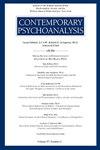Inconsolable Infantile States and the Challenges of Meeting Them
IF 0.5
4区 心理学
Q4 PSYCHIATRY
引用次数: 0
Abstract
Abstract Occasionally a patient comes along who is so frozen in an infantile state of disorganized attachment that the patient cannot take what the therapist is offering yet cannot leave the therapist either. Instead the two remain stuck in an unholy scenario of protracted destructive enactments, chronic mis-attunement, and rigid indigestible projective identifications. These seemingly impossible therapeutic encounters can include psychotic transferences, negative therapeutic reactions, or impasses. This article examines two such cases in detail and explores possible ways of understanding what failed in each of them and the impact of this on the therapist.难以解决的幼儿国家及其应对挑战
偶尔会出现一个病人,他处于一种混乱的依恋的婴儿状态,病人不能接受治疗师提供的东西,也不能离开治疗师。相反,这两个国家仍然陷入了一种邪恶的局面,即长期的破坏性立法、长期的失调和僵化的、难以消化的投射性认同。这些看似不可能的治疗遭遇可能包括精神病转移、负面治疗反应或僵局。本文详细研究了两个这样的案例,并探索了可能的方法来理解每个案例中失败的原因以及这对治疗师的影响。
本文章由计算机程序翻译,如有差异,请以英文原文为准。
求助全文
约1分钟内获得全文
求助全文

 求助内容:
求助内容: 应助结果提醒方式:
应助结果提醒方式:


